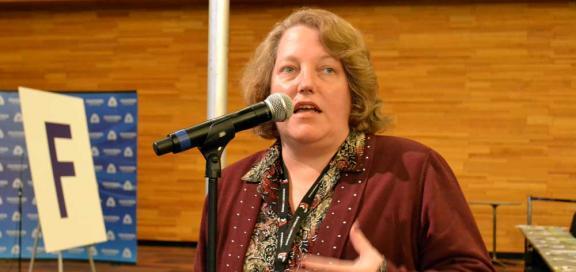After the lunch break delegates debated a hotly contested resolution which would slightly increase per capita dues to the Federation. After much impassioned debate and a standing two-thirds vote, the resolution passed by 880 for and 330 against.
Following the Constitution and Structure Committee report and resolutions, guest speaker Out in Schools Executive Director Drew Dennis talked about their community-funded program to educate high-school students about lesbian, gay, bisexual and transgendered issues and acceptance. With support from several major unions including the BCTF, Out in Schools has reached 38,000 students in communities across BC since the program started in 2004. Dennis pointed out that only about one-third of BC school districts currently have policies against homophobic bullying, and there is no mandatory BC curriculum that addresses the issue. Dennis’ report was a perfect lead-in to the report from the Human Rights Committee.
Human Rights Committee Chair Lorene Oikawa from the BCGEU talked about some of the achievements and challenges the Committee and labour movement faced over the past two years. One of the key achievements she cited was last year’s BC Fed Renewal conference. Unions worked hard at that conference to make sure the delegations they were sending were diverse and it was a successful way of engaging many workers of colour in the work of the Fed.
Oikawa identified as a continuing struggle the fight for LGBT, women’s, and Aboriginal equality, as well as equality for people with disabilities and people of colour. The Human Rights Committee helps organize affiliate participation in events like the Pride parades, and also takes on educating union members and the public on human rights issues.
“Too little is being done to ensure that transgender workers are being respected with the same dignity we except for all working people,” said Oikawa in example.
The report, which was passed, recommended that the BC Federation of Labour continue to work with community and advocacy groups to educate and advance human rights in communities and workplaces, support alliances that promote inclusion and fight hate, maintain focus on union renewal and discuss ways to improve representation on diversity of union members.
Further, the committee recommended tracking diversity participation in events and identifying training and mentorship opportunities for equity-seeking labour activists to promote leadership and improve diverse participation in the labour movement.
Next, as a lead-in to the Education Committee report, former Cowichan Valley School Board Chair Eden Hawthornthwaite spoke to convention about her experience having their entire board fired by the provincial government after trying to implement a budget to restore services to children and teachers.
Since 2009, Hawthornthwaite said, “Our district has been obliged to cut over $11 million in programs and services to our children to meet the rigors of a phony program of austerity.” She noted these cuts have mostly come at the expense of the most vulnerable children.
Their proposed restoration budget was written through consultation with community groups.
“We were fired without one word of dialogue with the Minister … the only response were threats uttered in the press and letters telling us we would not be received in Victoria,” said Hawthornthwaite.
The district is now being run by a ministry appointee, with the government refusing to hold a school board by-election before November 2013.
"Working people’s kids do not figure in the plans this government has for our public schools,” said Hawthornthwaite, “It is a deliberate program by government on behalf of those they enthusiastically represent."
She asked delegates to help her and the other trustees to return them to their rightful place as elected representatives in the district, and to increase efforts to recover the funding taken from schools since the stripping of class size and composition language from the BCTF collective agreement.
The Education Committee report that followed Hawthornthwaite was wide-ranging, addressing public K-12 and post-secondary education as well as training of union members. The Apprenticeship and Skills Training Working Group further addressed issues in that area.
One of the recommendations the committee brought forward encouraged affiliates to build union counseling networks and to send more delegates to take union counseling training. The Union Counselling Program is a key part of the United Way-Labour partnership wherein union members take United Way training in order to be able to provide peer support for coworkers facing challenging life situations.
“I cannot say enough for the Union Counselling program and what it does for members in our workplaces,” said MoveUP Vice President Gwenne Farrell, “We need to make sure that we have trained union counselors in every worksite.”
Farrell encouraged other affiliates to follow MoveUP’s lead in promoting the program through regular training, as we do in our annual Job Stewards Seminar.
On K-12 and public post-secondary issues, the report recommended demanding the provincial government initiate a funding formula review to ensure the needs of all students are met regardless of geographic location, disabilities, or challenges they might face.
Photo caption: Vice President Gwenne Farrell speaks to Union Counselling program



